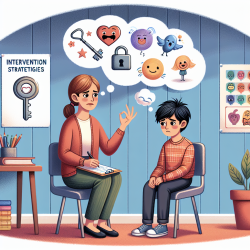Introduction
The field of speech-language pathology is continuously evolving, with new research offering insights that can enhance therapeutic practices. One such research is "The Relaxation Exercise and Social Support Trial (RESST): Study Protocol for a Randomized Community-Based Trial" by Kobeissi et al. This study provides a framework that practitioners can utilize to improve outcomes for children through psychosocial interventions. By integrating relaxation exercises and social support into therapy, practitioners can address not only speech and language issues but also the mental well-being of their clients.
Key Findings from the RESST Study
The RESST study focuses on a psychosocial intervention aimed at reducing medically unexplained vaginal discharge (MUVD) in Lebanese women by addressing common mental disorders (CMDs) such as anxiety and depression. The intervention consisted of structured social support and relaxation exercises, conducted over 12 sessions. The primary outcome was a reduction in self-reported MUVD, with secondary outcomes being improvements in anxiety and depression symptoms.
Although the study targeted adult women, the principles of relaxation and social support can be adapted for children in therapeutic settings. The research highlights the significant role of mental health in physical symptoms and the effectiveness of simple, structured interventions.
Application in Speech-Language Pathology
Practitioners can draw from the RESST study to enhance their therapeutic approaches for children. Here are some ways to implement these findings:
- Incorporate Relaxation Techniques: Use progressive muscle relaxation and guided imagery to help children manage anxiety and stress, which can impact speech and language development.
- Enhance Social Support: Create group therapy sessions where children can engage in social interactions and support each other, fostering a sense of community and reducing feelings of isolation.
- Focus on Mental Well-being: Recognize the interplay between mental health and speech-language issues. Addressing underlying anxiety or depression can lead to more effective speech therapy outcomes.
Encouraging Further Research
While the RESST study provides valuable insights, further research is needed to explore the application of these interventions in pediatric speech-language pathology. Practitioners are encouraged to conduct their own studies or collaborate with researchers to examine the impact of relaxation and social support on children's speech and language development.
By contributing to the body of research, practitioners can help develop evidence-based practices that improve outcomes for children and support their overall well-being.
Conclusion
The RESST study offers a compelling case for integrating relaxation exercises and social support into therapeutic practices. By focusing on mental health and community support, practitioners can enhance their skills and create better outcomes for children. To explore the original research paper, please follow this link: The relaxation exercise and social support trial-resst: study protocol for a randomized community based trial.










